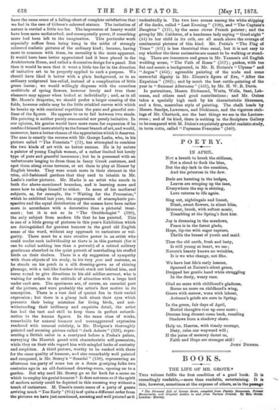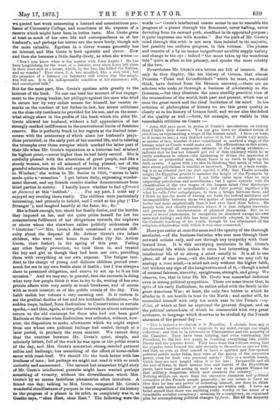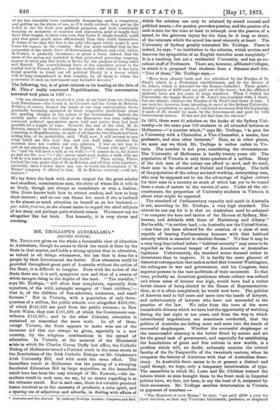BOOKS.
THE LIFE OF MR. GROTE True; volume fulfils the first condition of a good book. It is exceedingly readable,—more than readable, entertaining. It is this, however, sometimes at the expense of others, as in the passage
• The Personal Life of George Grote, compiled from Family Documents, Private Memoranda, and Original Letters to and from Various Friends. By Mrs. Grote. London: Murray. we quoted last week concerning a learned and conscientious pro- fessor of University- College, and sometimes at the expense of a
reserve which might have been in better taste. Mrs. Grote gives at least as much of her own life and correspondence as of her husband's, and perhaps her letters are the more lively, though not the more valuable. Egotism in a clever woman generally has an interest, and Mrs. Grote is both egotistic and clever. Now and then she becomes a little deadly-lively, as when she writes :—
" Don't you know what is the matter with John Austin ? He has been languishing for the want of a listener, ever since Lucy left them in their meat-safe of a house, which, by the bye, has killed the Nubian, and no wonder I Ever since, J. A. has moulted, like a sick bird ; but the presence of a listener (or listeners) will revive him like magic, you will see. It is the indispensable condition of his existence ; talk, and monological talk."
But for the most part, Mrs. Grote's egotism adds greatly to the interest of the book. No one can read her account of her engage- ment to the young banker, her philippic against the man who tried to secure her by very unfair means for himself, her caustic re-
marks on the conduct of her father-in-law, her severe criticisms on the close city residence he provided for his son, and on the some- what stingy share in the profits of the bank which the elder Mr.
Grote allowed her husband, without a full appreciation of her strongly marked indifference to the conventional limits of feminine reserve. She is perfectly frank in her regrets at the limited inter- course with the aristocracy of which alone her husband's preju- dices permitted, in the early part of her married life, and in relating the triumphs over those scruples which marked the latter part of their life when Mr. Grote's reputation as a historian had attained its highest point,—never higher than he had fairly earned. She is cordially pleased with the attentions of great people, and like a sturdy woman, not at all ashamed of being pleased, nor of the grateful admiration she felt and expressed in return. " Our going to Windsor," she writes to Mr. Senior in 1848, " seems to have made quite a ' sensation.' I get letters daily, expressing wonder- ment thereat, and my friends receive similar demonstrations from
third parties in society. I hardly know whether to feel affronted or flattered at this ' hubbub . ' For my part, I must say I enjoyed my evening there vastly. The children were particularly interesting, and princely to behold. and I cried at the play (' The Stranger '), and laughed heartily at the farce, &c., &c."
She is frank enough, too, about her family duties, and the burden they imposed on her, and she quite pities herself for her too conscientious fulfilment of her obligations towards the nephews or nieces whom she elsewhere rather publicly nicknames the
" Groticles :"—" Mrs. Grote's death occasioned a certain diffi- culty about the disposal of Mr. Arthur Grote's two infant children, who were sent home from India (by Mr. Arthur Grote, their father) in the spring of this year. Failing any other family protection, we took them in, and treated the boy and girl as though they had been our own, providing
them with everything at our own expense. The fatigue inci- dent to the charge of young and delicate children proved over- much for me in my own feeble state of health ; but I was always a slave to presumed obligation, and strove to act up to it on this occasion." And we may say, in general, that she succeeds in doing what very few people think it wise to try to do, writing of her own private affairs with very nearly as much frankness, and of course with as much interest, as of the public events of the day. This habit makes her volume a very amusing one. It is curious to see the gradual decline of her and her husband's Radicalism,—the sudden leaps, indeed, from Radicalism to Conservatism at certain epochs,—and then, again, at irregular intervals an almost automatic return to the old contempt for those who had not been good Radicals at the time when Radicalism was orthodox, without, how- ever, the disposition to make allowances which we might expect from one whose own political feelings had cooled, though at a later period, in precisely the same manner. We cannot deny that the contrast between Mr. Grote's quiet, simple, and scholarly letters, full of the work he was upon or the public events of the day, and Mrs. Grote's somewhat strong-minded personal
sallies and badinage, has something of the effect of horse-radish sauce with roast-beef. We should like the book better with less
loudness of tone ; but perhaps we might not read it with so much curiosity and amusement. The earnest but somewhat frigid story of Mr. Grote's intellectual pursuits might have wanted perhaps something of vivacity, without the diversification which Mrs. Grote's by no means fastidious pleasantries often introduce. A
friend one day, talking to Mrs. Grote, compared Mr. Grote's wonderful steadfastness of purpose in the composition of his history to the progress of a planet in its orbit, so completely was it, as
Goethe says, "ohne Haat, ohne Rant" The following were the words :—" Grote's intellectual course seems to me to resemble the progress of a planet through the firmanent, never halting, never deviating from its onward path, steadfast in its appointed purpose ; it quite impresses one with wonder." But the path of Mr. Grote'e mind through this orbit is not seen thus isolated in its majestic, but possibly too uniform progress, in this volume. The phases and transits of a by no means insignificant satellite supply variety and change to the eye ; indeed " the moon takes up the wondrous tale" quite as often as her primary, and speaks the more volubly of the two.
Nevertheless Mr. Grote's own letters are full of interest. Not only do they display, like his history of Greece, that almost Prussian " Fleiss and Griindlichkeit " which he must, we should think, have derived from his Bremen ancestry,--there are no scholars who make so thorough a business of scholarship as the Germans,—but they illustrate the same steadily practical view of the transactions of the world, both past and present, which was at once the great merit and the chief limitation of his mind. In his criticism of philosophies of history we see this great quality as clearly as in his history of Greece itself, and we see also the defect of the quality as well ;—both, for example, are visible in this remarkable criticism on Comte :-
"John Mill says more in praise of Comte's speculations on history than I think they deserve. You say you have no distinct notion of fetichism, as representing a stage of the human mind. I have (at least„ so it seems to me,) a very distinct notion of it, but I doubt very much, as matter of fact, whether it ever constituted so marked a stage of the human mind as Comte would make out. His affirmations on this point, —positive beyond all reasonable estimate of the existing evidence,— indicate that he has not himself got rid of that tendency which ho so justly condemns in others—the hankering to divine the mysteries of inchoate or primordial man, where there is no torch to light up the dark cavern. I agree with you also in thinking that much of what he says about polytheism is fanciful or incorrect. Think of a man assum- ing it as an attested fact (an fait capital, v. 254) that Thales actually taught the Egyptian priests to measure the height of the Pyramids by the length of the shadows 1 I set little value upon what he says respecting polytheism and monotheism; but I agree entirely with his classification of the two stages of the human mind rata theologique (either polytheistic or monotheistic), and teat positif, together with what ho calls l'etat metaphysigue, to form a bridge between them, and I think he has the merit of having set forth the radical antithesis and incompatibility between these two modes of interpreting phenomena better and more emphatically than it had ever been done before. He keenly feels and clearly perceives where it is that religion traverses and perverts the interpretation of physical phenomena. But as to moral or social phenomena, he recognises no standard except his own taste and feeling ; and this has been passively adopted, in him, from the Catholic teaching of his youth, though he has eliminated all the religious echafaudage with which it was once connected."
Here you notice at once the sense and the opacity of the thorough secularist,—of the business-historian who sees men through their outward actions only, and not through any sympathy with their inward lives. It is this unvarying secularism in Mr. Grote's intellectual life which makes it seem less interesting than the intellectual life of so strong a mind usually is. It is all in one plane, all of one piece,--all the history of what we may call by analogy a tame mind,—a mind not only without the higher faith, but without any sign of the imaginative need of it,—though a mind of unusual fairness, sincerity, uprightness, strength, and grasp. We observe, too, that in later life Mr. Grote was somewhat deficient even in strong political sympathies. There are some traces that, in spite of his early Radicalism, he rather sided with the South in the great American War ; at least, the only two letters in which he alludes to it are hostile in tone to the North ; and earlier still, he reconciled himself with only too much ease to the French coup d'Itat, of which at first he expressed the greatest disgust, and on the political antecedents of which be commented with very great acuteness, in language which deserves to be studied by the French alarmists of the present day :— ‘, This is indeed a revolution /i la Napoltbn. I abstain from any of the thousand matters which it suggests to my mind, except one single reflection; and that is, in reference to Changarnier and the majority of the Chamber. They have been helping, and even outrunning, the President, for the last two years, in crushing everything like public liberty and the popular force. They have done this without seeing that the popular force formed the only security to themselves as against him, and that, as soon as they ceased to have a spirited and free-spoken political public under them, they were at the mercy of the executive power, even for their own personal safety ! This is a terrible lesson, which they are now taught when it is too late : Tocqueville and all- the rest of them, in their intense fear and hatred of the Republican party, have been just acting in such a way as to prepare France for that military despotism which now menaces the country." Nothing strikes me more than the excessive alarmism and political cowardice of the French people generally ; no one seems to have an idea that he has any power of defending himself, nor does be think himself safe unless soldiers or gendarmes are within call. I have no belief myself that there was anything really worthy of the name of a formidable socialist conspiracy : meaning by a conspiracy, an organised plan for accomplishing political changes by force. But all the majority of the late Assembly were continually denouncing such a conspiracy, and getting up the alarm of one, as if it really existed ; they got up the belief in one for their own political purposes, and were continually heaping on measures of coercion and repression, until at length they have been taught, to their own cost, that Louis N. single-handed, could play that game much more efficaciously than they could themselves. It seems to me that this fear is the only idea upon which Louis N. now bases his •ruparp;s in the country. But you must recollect that he has possession of the whole force of Government, military and civil, which, in France, is perfectly enormous ; so great a force, indeed, that the mass of the nation not included in that joint-stock governing company, appear to exist only like herds or flocks for the purpose of being ruled and fleeced. The overwhelming force of the executive power is the capital fact in French politics; and the facility with which it has been found possible to tread out all political liberty is a lesson which will be long remembered in that country, by all those to whom the possession of such an instrument may hereafter devolve."
The following, too, is of great interest in its bearing on the date of M. Thies s' really convinced Republicanism. The conversation narrated took place in 1867 :—
" On one afternoon we received a visit at our hotel from two friends, both Frenchmen—the Count A. de Circourt and the Count de Belveze. Politics, of course, formed the staple of our long conversation, Grote gradually becoming animated by their respective predictions about the pending changes in the course of the Government. Indeed, the malady under which the Chief of the Executive was then suffering rendered political speculation more bold and active than had been possible for a length of time. Towards the end of the visit, M. de Belveze, amused by Grote's seeming to doubt the chances of France returning to Republicanism, in spite of all that the two friends had been telling him of its probability, said, 'Well, now, I will recount to you -what befell me this very day, and you shall judge whether the incident does not confirm our own opinions. I was on my way to call on my physician, when I met M. Thiers. "Come with me," cries he, "and we will have a talk as we walk."—"I cannot do so, for Incrust go and see Dr. —."—" Ah ! never mind your doctor, a walk with me will do you much more good than any doctor !" ' Thus saying, Thiers tucked his arm under that of M. de Belveze, and off they went together ; naturally, since I never knew any one to resist the fascination of M. Thiers' company if offered to him. M. de Belveze certainly could not, anyhow."
We lay down the book with sincere respect for the great scholar and steadfast, conscientious man, the story of whose life it tells in so lively, though not always so considerate or wise a fashion. Mrs. Grote knows both how to attract readers, and how to keep their interest ; and no one can blame her much if she is inclined to fix almost as much attention on herself as on her husband,— par nobile fratrum, as she almost seems to regard the chief subjects of her story, not perhaps quite without reason. We cannot say we altogether like her book. But honestly, it is very clever and amusing.




































 Previous page
Previous page